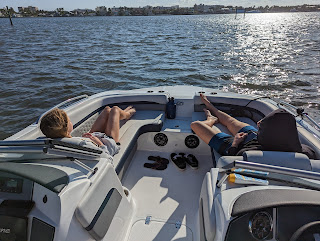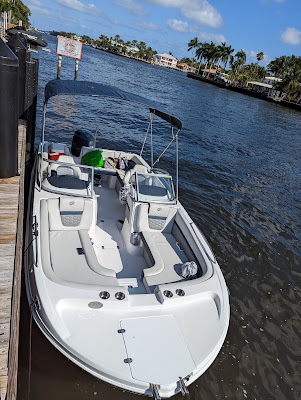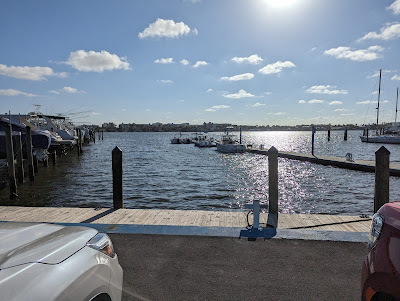This is the time of year when fog forms on the waters. Any significant difference between air and water temps makes fog likely.
So let's assume that you are returning to your dock from a distant spot and you encounter fog aka "restricted visibility."
What should you do?
The most conservative response would be to wait out the adverse conditions in a safe place. A dock or a protected/sheltered anchorage would suffice.
But maybe you need to get clear of where you are when you find yourself in fog.
In no particular order:
Step 1: Slow to a safe speed. This will probably be similar to no-wake speed. 5ish mph. Your chart plotter is now very important. Use it to maintain orientation. Remain on the right side of any channel.
Step 2: At least every two minutes make the restricted vis. sound signal for a vessel underway and making way. On a larger vessel this will be 1 prolonged blast on your ship's whistle. (4-6 seconds)
On a smaller boat you must have some "efficient means of producing sound." You can bang pots and pans together but your voice is not legal (but it is better than nothing if it is all you have.)
A red plastic whistle is legal but a can air horn is better- the kind people use at football games. Those can be heard at a distance. If your boat has an installed horn that works, you can use that. Loudest is best.
Step 3: Turn on your navigation lights and any other flood/spreader lights you have. You must increase your visibility to other vessels.
Step 4. Turn off your sound system and make your boat as quiet as possible. Since you can't see you need to hear what is going on around you.
Position a lookout / listening watch as far forward in your boat as possible. That person should be actively listening for the sound of another vessel forward of your beam (in the semicircular arc from straight out your right side to straight out your left side.)
He or she should also listen for waves breaking on rocks or a bar, a bell ringing, another vessel's sound signals etc. Anything solid...
Step 5. If you become aware of another solid object forward of your beam (boat/ship/aid to navigation etc.) you may need to "take all way off of your vessel" and only use power to maintain control. Go very slow until you negotiate that hazard.
You can make more frequent sound signals, but do not make the "danger doubt" signal of 5 short blasts in rapid succession. If you stop dead in the water make 2 prolonged blasts at least every 2 minutes. This lets another vessel know you are underway but not making way. (wake) If you hear a combination of 1 prolonged and 2 short blasts it may be a vessel towing. Avoid that.
Step 6. If you will change course to avoid a vessel to your front, do not change course to the left.
Step 7. Use your VHF radio to coordinate with other vessels. Advise where you are--in fog--and where you are going. Do this first on channel 16. You may then arrange to speak with another vessel on a different channel, like 13. Ships in the Savannah River moniter 16 and 13. Here is but one example of an advisory call. Yours may differ. Try and be "accurate, bold, and concise."
"All vessels in the vicinity of Savannah and Daufuskie Island, South Carolina . This is Island Shuttle number 1. There is fog in the area. We are proceeding from Savannah Boathouse to Daufuskie County Dock via Bull River, St Augustine Creek, Elba Cut, crossing the Savannah River, Field's Cut, Wright River, Wall's Cut and New River. Any concerned traffic please advise your position and intentions."
We have made that call before and had a ship pilot on a giant ship tell us that he was in the river outbound and would be crossing the ICW in 15 minutes. Good intel.
Remember, not everyone operating a boat in fog has a radio (on). Not everyone is familiar with the rules--you may have a boat blow by you going 30 mph, unlit and blissfully unconcerned. It happens.
These suggestions are not meant to replace formal training and should not be thought of as all-inclusive. We don't have radar or vessel AIS.
Finally, reiterating that the most conservative response is to wait for better conditions.
SB
https://www.ecfr.gov/current/title-33/chapter-I/subchapter-E/part-83/subpart-D/section-83.35


















